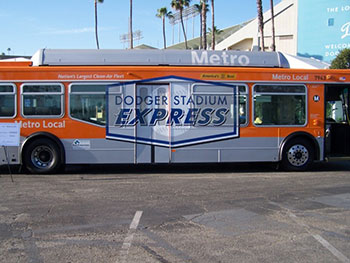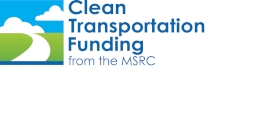 As baseball season unfortunately comes to an end for the Los Angeles Dodgers, a race for the pennant was not in the cards. However, the Dodgers did knock one out of the park this season with the Dodger Stadium Express, with the help of funding from the MSRC.
As baseball season unfortunately comes to an end for the Los Angeles Dodgers, a race for the pennant was not in the cards. However, the Dodgers did knock one out of the park this season with the Dodger Stadium Express, with the help of funding from the MSRC.
The MSRC provided Metro with $300,000 in Clean Transportation Funding to operate a shuttle service to transport fans roundtrip from Union Station to Dodger Stadium for every home game this season using clean-fueled CNG transit buses. The MSRC's funding was instrumental to the success of the project. "We couldn't have done it without the funding from the MSRC," said Warren Morse, Metro's Deputy Executive Officer for Communications. "Funding for these types of projects is very tight, so it was a tremendous help in getting the project off the ground."
Metro and the Dodgers worked together to promote the service both in and out of the stadium. According to Warren, the service was promoted heavily to riders across their bus fleet through brochures, posters and Metro's Transit TV, which ran a 30-second spot about the service throughout the season. Metro also promoted the service through their "Metro Briefs" which are monthly advertisements announcing what Metro is doing in the community published in more than 100 newspapers. Ads for the shuttles were played during the Dodger radio broadcasts, and in-stadium promotions were done as well.
In addition to the more traditional forms of outreach, internet transportation tools also helped make people aware of the service. "People have been using Google Transit and Google Maps to get to the games and are linking up to the Dodger Stadium Express information through these services," said Conan Cheung, Metro's Deputy Executive Officer of Service Development. "Metro is part of Google's trip planning service, so people can access the shuttle information this way too. We've seen people show up on game day with their Google print-outs in their hand."
The service was a grand-slam from the beginning. For opening day on April 13, more than 3,000 fans took the shuttle. For the second most popular game this season - the New York Yankee games in June - approximately 2,600 people rode the Express. On average, about 1,600 passengers rode the shuttle for each game. In comparison, an average of about 700 people rode the "Dodger Trolley" provided by LADOT during the 2008 season, which shows how successful the Dodger Stadium Express was this year. In fact, with 83 home games at Dodger Stadium, including two exhibition games, more than 132,000 fans rode the Dodger Stadium Express this season.
"One of the reasons it worked so well has been because we were able to provide the service for every single game," Warren said. "This type of service has been tried in the past - A few years ago, Metro provided a shuttle but was only able to provide the service for Friday games, so this worked out to about once every two weeks."
He also referenced LADOT's "Dodger Trolley" from 2008 and said that their shuttle only began mid-way through the season. "For the Dodger Stadium Express, we were able to promote the service prior to the season and all the way through. Having the service all season long is what really made the difference. People knew they could depend on the service," he explained.
On average, about 10 shuttles per game were used to take fans to and from the stadium. For games with larger attendance, such as opening day and the series with the Yankees, Metro used up to 14 buses.
A majority of the riders used the service to continue their public transportation route into Dodger Stadium. Conan pointed to a survey Metro conducted of riders for the Dodgers vs. Angeles game in June to track from how far away people were coming to use the Express. "Sixty percent used transit to get to Patsaouras Plaza to board the shuttles. Riders came from Ventura, Riverside, Orange and San Bernardino Counties, and the majority used Metrolink and Metro Rail to get to Union Station," he said. "Thirty-eight percent drove to Union Station and two percent walked. This data shows that people see the Dodger Stadium Express as a link to use transit versus driving and using the service as a parking shuttle," he commented.
As for continuing the service next year, both Warren and Conan are hopeful. "Riders definitely appreciated the service and want it to continue next year," Conan said. Warren noted that if funding can be worked out, Metro would want to continue to operate the shuttles. "Now that we have a season's worth of experience and riders behind us, people will want to come back to the service next year."
Warren likened the experience of riding the Dodger Stadium Express to using a similar service to the Hollywood Bowl. "People realize getting to the Hollywood Bowl is so much easier and a whole lot more fun by riding a shuttle. The experience begins as soon as you board the bus for the Bowl. Everyone has their picnic baskets and is in a good mood," he remarked. "It's the same thing on game day. The game experience begins as soon as they step onto the Dodger Stadium Express. Everyone is so excited about the game and wearing their Dodger Blue. It's a shared experience that you don't get by driving your car to the stadium."
